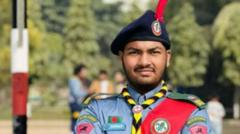As Bangladesh celebrates the removal of former Prime Minister Sheikh Hasina, a mix of optimism and apprehension permeates the nation. While plans for a "New Bangladesh" are laid out amidst local festivities, rampant violence, calls for women's rights, and struggles against extremism cast a shadow over the country's future.
Hope Amidst Chaos: The Future of Bangladesh After Hasina's Ouster

Hope Amidst Chaos: The Future of Bangladesh After Hasina's Ouster
Celebrations in Dhaka mark the anniversary of Sheikh Hasina's departure, but challenges abound in navigating a new political landscape.
In the heart of Dhaka, jubilant crowds gathered this week, celebrating the anniversary of former Prime Minister Sheikh Hasina's exit from power and the dawn of what leaders are referring to as a "New Bangladesh." Despite the excitement, the road ahead is fraught with uncertainty.
Amidst rain-soaked festivities, the interim government led by Muhammad Yunus revealed ambitious plans aimed at crafting a new national identity, seeking to embody the aspirations of millions who participated in recent upheavals. Nationwide, citizens participated in concerts, rallies, and prayer sessions, proclaiming this pivotal moment as the "second liberation" of the predominantly Muslim nation of 170 million.
However, the celebrations mask significant underlying issues that have emerged in the past year. Rights organizations report alarming incidents of mob violence, including lynchings and religious extremism, which threaten to undermine the anticipated democratic reforms.
Sheikh Hasina, who now resides in India, remains silent on accusations of a brutal crackdown against dissent during her rule. Activists reflect on the disappointing trajectory since her ousting, asserting that despite regime change, deep-seated misogyny and male dominance persist unchallenged. Women's rights advocate Shireen Huq noted that while the interim government aims for social reform, there is fierce opposition from hardline groups, prompting fears that previously marginalized extremism is regaining footing.
Huq, leading initiatives to enhance women's rights, expressed discontent with the government's inadequate support in the face of backlash against essential reforms. As protests erupted across the nation, hardliners rallied against proposals for gender equality, emphasizing resistance to women's independence and personal rights.
Simultaneously, societal discontent simmered toward the prior Awami League government, which is accused of severe human rights abuses, including enforced disappearances. Calls for justice resonate, especially from those longing for accountability rather than retribution explained journalist David Bergman.
Transitioning through this chaotic phase, student leaders involved in the protests now hold positions in the interim government, raising concerns about their influence on policy. Critics argue that, although the government has stabilized the economy and maintained foreign trade, political inclusivity — particularly regarding the Awami League — remains in peril.
With a crucial elections on the horizon, experts point to the need for significant political reforms to ensure that the sacrifices made during the uprising are honored. Iftekhar Zaman, from Transparency International Bangladesh, stresses that unless authoritarian tendencies are abolished, the vision of a truly democratic Bangladesh could be jeopardized. As the nation stands at this pivotal crossroads, the upcoming months will determine whether the newly proclaimed vision can be translated into robust, meaningful change.


















